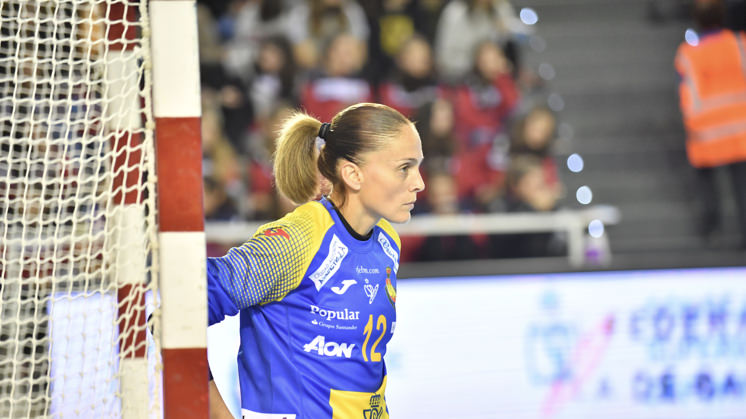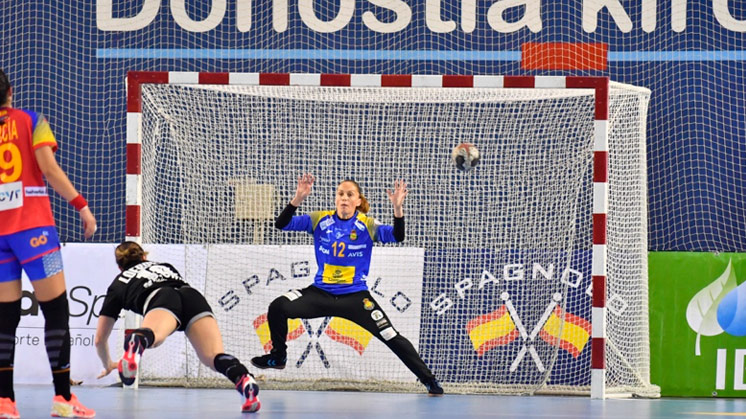An interview with Silvia Navarro
"Após tantos anos dedicados ao handebol, transformou-se em um modo de vida"
If there's one word that sums up Silvia Navarro's story, its achievement. She's just turned 40, and is still juggling being goalkeeper for her team every weekend and she intends to keep on winning titles.

Silvia Navarro (Valencia, 1979) is one of the best generation of Spanish handball players. Las guerreras (the warriors) won the bronze at the London Olympic Games in 2012, the team's greatest achievement. According to Silvia, "it was the first time I had taken part in the Olympics and standing on the podium was a dream come true."
Silvia, who has just turned 40, can see that the end of her career is near, but she's not ready yet. "This sport runs through my veins and I feel extremely lucky. For the time being I feel fine, because my body and mind are holding up". In fact, I intend to keep on winning titles. "I long to win the Iberdrola League with my club. And I'd love to win another medal for the team in a competition". The Olympic Games in Tokyo are just around the corner and Silvia has a goal...
You've been playing handball for many years. Would you say it's the 'love of your life'?
Handball has always been, is and will continue to be one of the loves of my life. Really, after so many years, handball has become a way of life.
You have won some great awards. Which of the medals made you feel happiest?
I remember all the medals I have won as though it were yesterday, because each has its own story and it was a struggle to get them. But if I have to choose, it's the bronze we won in London in 2012. It was the first time I had taken part in the Games and standing on the podium was a dream come true.
Joseja Hombrados (46 years old) is still in the game, and it looks as though you're going the same way. What is it about goalkeeping that you don't want to give up?
Hombrados is remarkable. The truth is that goalkeepers have longer careers than players, perhaps because it is less physically punishing. When it comes to my retirement, I have to be realistic, because I'm 40 years old. I don't think my career will go on for much longer, but I prefer to take things a year at a time. For the time being I feel fine, because my body and mind are still holding up. This sport runs in my veins and I feel extremely lucky. I know that when the time comes, my mind and my body will tell me "Silvia, it's time to go!"
What is the ultimate goal you would like to achieve?
I long to win the Iberdrola League with my club, Rocasa. It's the only one we haven't won. And I'd love to win another medal for the team in a competition.
Which coach has most influenced your career?
Ambros Martín was one of the most important coaches in my sporting life. He gave me the chance to play Champions regardless of who I was and my limited experience. For that, I thank him. Jorge Dueñas selected me for the team and I am grateful to him for all my experiences with las guerreras (the warriors). I must also mention Paco Santana, Antonio Moreno, Carlos Herrero, Carlos Viver and Roberto Santana, whose example I follow every day.
You are only mentioning men. When are we likely to see a woman, for example, leading the team?
I'm sure that the day will come when a woman will take the helm and do it brilliantly, because we are born workers.
You've seen the growth in women's sport in this country for yourself. What is behind this, and which obstacles remain to be overcome?
The catalyst has been that many companies and institutions have supported this sport through sponsorships. Society has also evolved a lot and has seen that we can develop our skills and values in the same way that men do. I have lived through some difficult times when nobody even listened to women and I am extremely proud that this has changed, particularly for the legacy it leaves for young women in the future. Women's sport has overcome obstacles little by little, but it is still difficult for it to be equal with men's sport. That's why we have to keep fighting to get to the top.

You were one of the first Spanish players to emigrate to a European league. What led you to make the decision and what did it mean to you?
I took the decision because of the crisis taking place in Spain at the time, and I wasn't the only one. A lot of players were forced to leave the country to keep their sporting and financial status. In my case, it was one of the most important and saddest decisions of my sporting career; however, it did give me the opportunity to live abroad. I discovered a new country, a new culture, and a new way of playing. Learning that I was capable of living alone so far from home made me grow a lot as a person.
Who is the best player you have ever come up against?
There are some very good players, but if I have to choose I'd have to mention two that make me suffer when I'm playing with the team: Carmen Martín and Alexandrina Barbosa. I'd also include Cristina Neagu and, as far as I am concerned, the best goalie is Katrine Lunde.
How do you see the present and future of the Iberdrola League?
The Iberdrola League went through a very important transition and the truth is that, these days, it is a pleasure to compete. Seeing so many highly skilled young players is very gratifying.
What does it mean to you to be an Iberdrola ambassador and what is your role?
There are many players who would be brilliant in this role, and I am enormously grateful for this accolade. What I try to do in this role is to help Iberdrola with its sponsorship of women's sport as much as I can: I share my opinions with other players, talking about the work done by the company in women's sport, and I collaborate wherever possible.
What does Iberdrola's commitment to women's sport mean to Iberdrola?
The commitment shows that they believe in us, and that is more than enough to keep moving ahead in all facets of life and sport.
If you could say anything to all those little girls who want to follow in your footsteps, what would it be?
Firstly, that they should enjoy what they do. That's at the heart of it. Sport has given me a lot and taken very little, which is why I encourage all girls to do all the sports that they like without thinking about goals. During the process, they will acquire values like respect and discipline. Sport is life.




